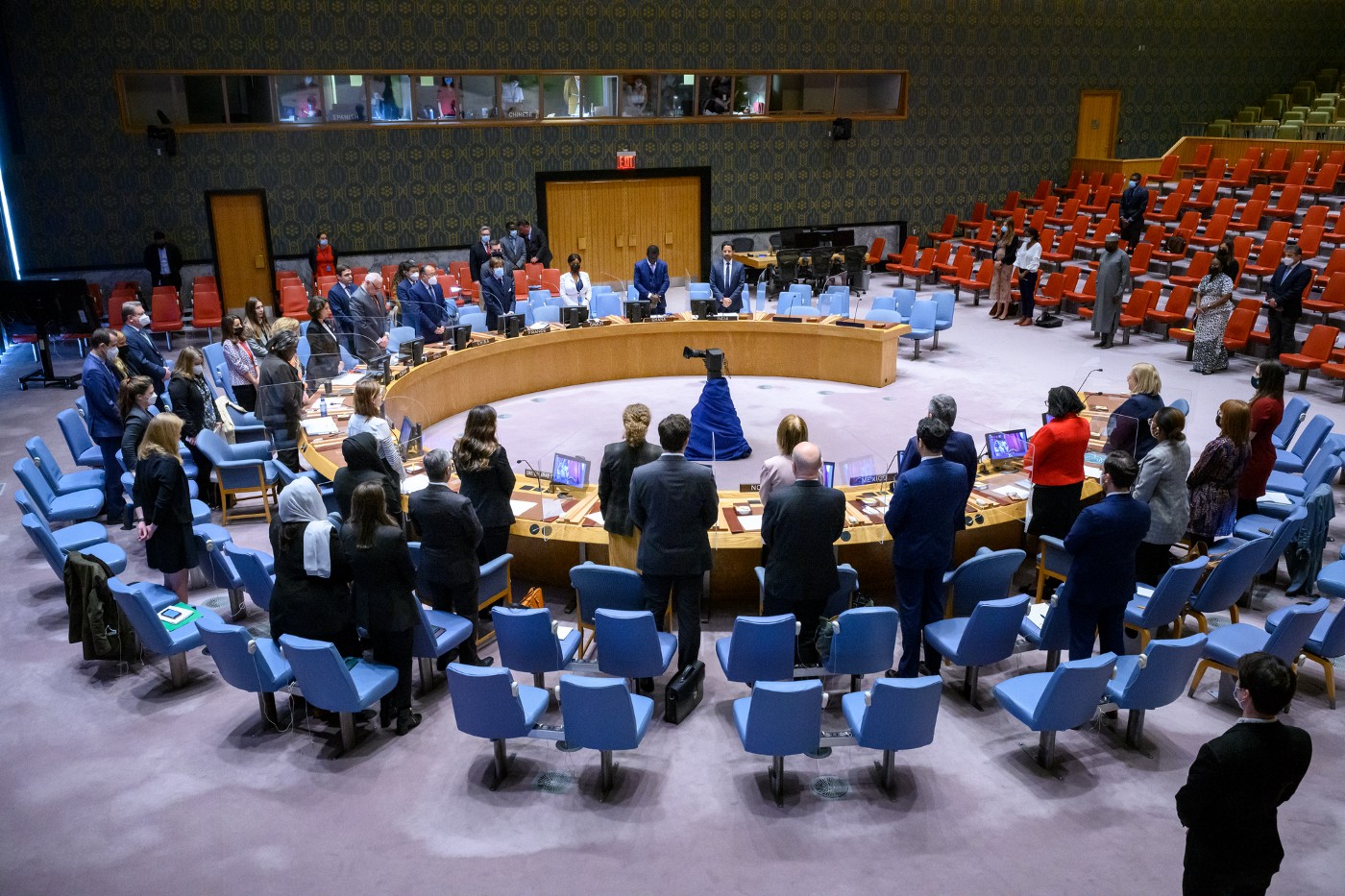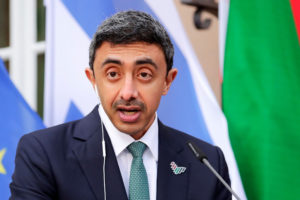May, with the United States presiding over the Security Council, food security and conflict, technology and security, and protection of civilians in armed conflict were in focus. Council members also discussed the situation in Bosnia and Herzegovina, non-proliferation and the activities of the G5 Sahel force. The situation in Ukraine was the subject of four separate meetings throughout the month. Additionally, there were six briefings on other situations under the purview of the Department of Political and Peacebuilding Affairs (DPPA).

Ukraine
Secretary-General António Guterres briefed the Council on 5 May on his travel to Moscow and Kyiv on 26 and 28 April, respectively. “The war on Ukraine is senseless in its scope, ruthless in its dimensions and limitless in its potential for global harm,” he said. Guterres reported progress in the evacuation of civilians from besieged Mariupol in efforts coordinated with the International Committee of the Red Cross (ICRC). “It is good to know that even in these times of hyper-communications, silent diplomacy is still possible and is sometimes the only effective way to produce results,” he said.
On 6 May, Council members in a presidential statement (S/PRST/2022/3) expressed strong support for the Secretary-General’s efforts in the search for a peaceful solution to the war in Ukraine, in its first united action regarding that country since the beginning of Russia’s invasion in late February.
“The war in Ukraine, like all wars, is a child protection and child rights crisis,” said Omar Abdi, Deputy Executive Director of the United Nations Children’s Fund (UNICEF), who was one of two officials briefing the Council on 12 May. In the past month, he said, the United Nations has verified nearly 100 child deaths from the fighting, with an actual figure that is likely to be considerably higher. Joyce Msuya, Assistant Secretary-General for Humanitarian Affairs and Deputy Emergency Relief Coordinator, provided updates on UN joint efforts to negotiate more humanitarian pauses for the safe passage of civilians trapped by the fighting in Ukraine and humanitarian assistance provided so far. “Our recent efforts to evacuate civilians in the east have shown us that there is goodwill and common ground for us to build on between the parties,” she said.

Bosnia and Herzegovina
“More than 26 years since the singing of the General Framework Agreement for Peace, Bosnia and Herzegovina remains a country traumatized by war,” UN High Representative Christian Schmidt told the Council on 11 May. The international community must stand firm behind a peaceful, unified Bosnia and Herzegovina, he stressed, citing rising tensions, a months-long political stalemate and increasing speculation about the possibility of yet another conflict in Europe. In support of his authority as High Representative, and through targeted sanctions and other means, the international community has also demonstrated it is prepared to take a different approach. “We will not sit still while others seek to dismantle 26 years of peace, stability and progress,” he stressed. Regarding Bosnia and Herzegovina’s candidature for membership in the European Union — a path which would help resolve grievances and foster peace — he urged Europe to keep its doors open to Bosnia and Herzegovina and the rest of the Western Balkan nations.
Watch the full briefing here

Non-Proliferation/Democratic People’s Republic of Korea
Briefing the Council on 11 May, Assistant Secretary-General for the Middle East, Asia and the Pacific Khaled Khiari reported on the continued development and launch of missiles by the Democratic People’s Republic of Korea (DPRK). He echoed the Secretary-General’s grave concern and asked for Member States’ strengthened efforts to eliminate nuclear weapons. “The unity of the Security Council in this matter is essential to ease tensions, overcome the diplomatic impasse and avoid a negative action-reaction cycle,” he said, underscoring the Secretary-General’s commitment to working with all parties for sustainable peace and the complete and verifiable denuclearization of the Korean Peninsula.
To read his full remarks, click here

Threats to international peace and security
Speaking at a Council meeting on threats to international peace and security on 13 May, Thomas Markram, the Director and Deputy to the High Representative for Disarmament Affairs, reiterated that the United Nations is not aware of any biological weapons programme in Ukraine. He said that the UN currently has neither the mandate nor the technical or operational capacity to investigate information shared by the Russian Federation. Markram added that the Biological Weapons Convention does contain measures to address situations in which States parties have concerns or suspicions about the activities of their peers. He said that the Office for Disarmament Affairs stands ready to support any procedures under the Biological Weapons Convention that States parties might decide to use.

Iraq
Briefing the Council on 17 May, Jeanine Hennis-Plasschaert, Special Representative of the Secretary-General and Head of the UN Assistance Mission for Iraq (UNAMI), presented the Secretary-General’s latest report on key political developments and the Organization’s activities in Iraq since February. She said that there is a need for predictable governance rather than constant crisis management, underlining the importance of accountability as a key feature of the State. “The neglect of the population’s most basic needs has gone on for far too long,” she said.
To read her full remarks, click here

G5 Sahel
Terrorism in the Sahel is a slow-burning, mortal threat, Assistant Secretary-General for Africa Martha Ama Akyaa Pobee, told the Council on 18 May, briefing the Council on the activities of the Joint Force of the Group of Five for the Sahel (G5 Sahel) and the UN Multidimensional Integrated Stabilization Mission in Mali (MINUSMA). She highlighted the impact of the 15 May decision by the Malian transition authorities to withdraw from the G5 Sahel and its Joint Force. Urging stakeholders to agree on how to best bring the transitions in Mali and Burkina Faso to a swift conclusion, she said the countries of the region need to bridge their differences and pursue common security aims.

Conflict and food security
“When war is waged, people go hungry,” said Secretary-General António Guterres at the ministerial-level open debate on conflict and food security on 18 May, noting that 60% of the world’s undernourished people live in areas affected by conflict. In 2021, most of the 140 million people suffering acute hunger lived in just 10 countries: Afghanistan, Democratic Republic of the Congo, Ethiopia, Haiti, Nigeria, Pakistan, South Sudan, Sudan, Syria, and Yemen. “When this Council debates conflict, you debate hunger,” he stressed. “And when you fail to reach consensus, hungry people pay a high price.” There is enough food for everyone in the world, but the issue is about distribution. “In our world of plenty, I will never accept the death from hunger of a single child, woman or man,” he stressed. Also briefing the Council was David Beasley, Executive Director of the World Food Programme, and Qu Dongyu, Director-General of the Food and Agriculture Organization (FAO).

Technology and Security
Briefing the Council on 23 May on technology and security, Rosemary DiCarlo, Under-Secretary-General for Political and Peacebuilding Affairs, said digital technologies have created fresh possibilities for the UN’s peace and security work. However, advances in technology have also created significant new risks and can affect conflict dynamics for the worse, including using lethal autonomous weapons, technology to target civilian infrastructure, and social media to fuel violence and spread disinformation. DiCarlo stressed that more must be done to advance, elaborate and implement a normative framework to ensure responsible behavior in cyberspace.
To read her remarks to the Council, click here

Somalia
James Swan, Special Representative and Head of the UN Support Mission in Somalia (UNSOM), during his briefing to the Council on 23 May, said the conclusion of Somalia’s electoral process the past week is a major milestone for the country. The Presidential contest followed an unduly protracted and contentious process to choose members of the legislature. Once the Senators and Members of Parliament were sworn in on 14 April 2022, however, they moved quickly to prepare for the Presidential vote. The new President was elected and sworn in on 15 May, and the outcome has been fully accepted. Speaking about the humanitarian situation in Somalia, Swan warned that following the failure of a fourth consecutive rainy season, the number of people affected by the drought has risen to 6.1 million.
To read his remarks, click here

Sudan
Time is short for Sudan to reach a solution to its protracted political crisis, Volker Perthes, Special Representative of the Secretary-General and Head of the UN Integrated Transition Assistance Mission in Sudan (UNITAMS) told Council members on 24 May. He warned that if the impasse is not urgently overcome, the consequences will be felt beyond national borders, impacting a whole generation. “The crisis facing Sudan is entirely homegrown and can only be resolved by the Sudanese,” he added. In his briefing, Perthes called on the military leadership and the Sovereignty Council to release the remaining detainees, cease arbitrary arrests, and lift the state of emergency without limitations. “It is time for all violence to end,” he stressed.
To read his full remarks, click here

Protection of civilians in armed conflict
On 25 May, during a debate on protection of civilians in armed conflict, Ramesh Rajasingham, Director of Coordination of the Office for the Coordination of Humanitarian Affairs, said that conflict continued to cause widespread civilian death last year. In densely populated areas, he recalled, civilians accounted for 90% of the casualties when explosive weapons were used. By mid-2021, fighting had forcibly displaced 84 million people, with nearly 51 million of them displaced internally, he said. The Ukraine war and other conflicts pushed the number of people fleeing to more than 100 million for the first time on record. Rajasingham called on states to investigate war crimes, prosecute perpetrators, ensure reparations for victims, and develop policy frameworks that build on these good practices. Also briefing were Robert Mardini, Director-General of the International Committee of the Red Cross, David Miliband, President of the International Rescue Committee and Rachel Boketa, Women for Women International Country Director in the Democratic Republic of the Congo.

Middle East
Tor Wennesland, the Special Coordinator for the Middle East Peace Process, told the Council on 26 May that there has been a familiar pattern of daily violence in recent weeks, including armed clashes, settlement expansion, evictions, demolitions, and seizures of Palestinian structures, as well as a deadly terrorist attack in Israel. In Gaza, he said, efforts by the UN and international partners to improve Palestinian lives and measures by Israel to ease pressure and facilitate more economic activity have enabled the fragile ceasefire to continue. Keeping the calm, however, is neither enough nor sustainable — more needs to be done to alleviate the humanitarian crisis and lift Israeli closures. “These dynamics — combined with the financial crisis — are dangerously converging and intensifying,” he warned.
To read his remarks, click here

Libya
Under-Secretary-General Rosemary DiCarlo briefed the Council on 26 May on the situation in Libya, voicing concern about the protracted political impasse and its increasingly negative impact on security. “It is imperative that the ceasefire in Libya be maintained, calm preserved and any steps that could result in renewed violence be avoided,” she said. DiCarlo urged all parties to uphold their commitment to the peaceful resolution of political differences through dialogue and negotiations. It is also critical that Libyan political and security actors continue to engage constructively in the upcoming Cairo talks in support of the electoral/constitutional track. “This is the only way to fulfill the aspirations of the Libyan people to select their representatives through the ballot box,” she stressed.
To read her remarks, click here

Democratic Republic of the Congo
Special Envoy for the Great Lakes Region, Huang Xia, during his briefing to the Council on 31 May, called on all armed groups in eastern Democratic Republic of the Congo (DRC) to renounce violence, immediately lay down their arms, and resolutely engage in the Kenya-facilitated Nairobi political dialogue process. He announced that he would shortly visit all the countries concerned in the region, before the next Nairobi Conclave. Xia stressed: “My message to the countries of the region will be threefold and simple: the region does not need a new crisis, let us keep the channels of dialogue open at all levels, including at the community level, and preserve the progress achieved in recent years through these various cooperation mechanisms.” Also briefing the Council was Assistant Secretary-General for Africa Martha Pobee.
Other meetings
Seven closed consultations were held in May: on resolution 1559; the situation in Afghanistan; Yemen; on the 1718 Committee; and on the use of chemical weapons and the political situation in Syria.
The Council, extended on 12 May the mandate of the United Nations Interim Security Force for Abyei (UNISFA) in Abyei, a contested region on the border of Sudan and South Sudan, as well as its tasks related to border monitoring for six months, until 15 November.
On 20 May, at the sixth Brussels Conference for Syria, Under-Secretary-General Martin Griffiths welcomed pledges totaling nearly $6.7 billion. He noted, however, that those commitments represent less than half of the total funding requirement for 2022. Underfunding means that humanitarian partners will need to prioritize their response and once again make difficult choices, he said.
The Council extended the mandate of UNAMI until 31 May 2023 on 26 May. It requested the Special Representative for Iraq and UNAMI to prioritize the provision of advice, support, and assistance to the Government and people of Iraq on advancing inclusive, political dialogue and national and community-level reconciliation, considering civil society input, with the full, equal, and meaningful participation of women. The same day, Council members also extended until 31 October 2022 the mandate of UNSOM, and for a year the sanctions regime imposed on South Sudan, including the arms embargo, travel ban and financial measures.
Also on 26 May, the Council failed to adopt a resolution that would have strengthened sanctions on the Democratic People’s Republic of Korea over its recent ballistic missile launches, with the representatives of China and the Russian Federation calling the measure “counterproductive” and “inhumane”.




